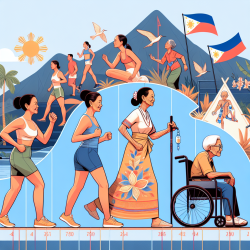Introduction
In an era where mental health is gaining much-needed attention, the demand for mental health professionals is at an all-time high. The World Health Organization (WHO) has been at the forefront of initiatives to bridge the gap in mental health services. One such initiative is the Mental Health Gap Action Programme Intervention Guide (mhGAP-IG), which aims to enhance mental health pre-service training. This blog will delve into how practitioners can leverage the findings from the research article "Enhancing mental health pre-service training with the WHO mhGAP Intervention Guide: experiences learned and the way forward" to improve their skills and outcomes for children.
The Importance of mhGAP-IG
The mhGAP-IG provides evidence-based guidance for assessing and managing common mental, neurological, and substance use disorders in non-specialized health settings. By integrating mhGAP-IG into pre-service training, future healthcare providers gain both theoretical knowledge and practical skills, better preparing them for their roles. This integration is crucial in addressing the global shortage of mental health professionals, especially in child and adolescent mental health services.
Implementation Strategies
Implementing mhGAP-IG in pre-service training involves several phases:
- Consultation: Engage with stakeholders to raise awareness about mhGAP-IG principles.
- Training Leaders: Educate educational leaders who will train faculty staff.
- Curriculum Planning: Formulate a work plan to integrate mhGAP-IG into the curriculum.
- Curriculum Review: Assess and enhance the existing curriculum.
- Adaptation: Tailor mhGAP-IG to fit the institution's specific needs.
- Pilot Testing: Implement a pilot curriculum and gather feedback.
- Evaluation and Revision: Refine the curriculum based on pilot results and implement the revised version.
Success Stories
Several institutions have successfully integrated mhGAP-IG into their pre-service training programs. For instance, Kyiv Medical University in Ukraine revised its psychiatry curriculum to include mhGAP-IG, emphasizing community-oriented mental health care. Similarly, the University of Ibadan in Nigeria developed a Master of Science program in Child and Adolescent Mental Health, incorporating mhGAP-IG principles.
Benefits of mhGAP-IG in Pre-service Training
Integrating mhGAP-IG into pre-service training offers several advantages:
- Early exposure to practical knowledge and clinical tools.
- Cost-effectiveness by reducing the need for extensive in-service training.
- Fostering a common understanding among various health workers.
- Strengthening health systems by preparing a skilled workforce.
Conclusion
For practitioners and stakeholders considering revising or introducing a new mental health curriculum, the mhGAP-IG offers a comprehensive framework. By enhancing pre-service training with mhGAP-IG, we can create a learning environment that nurtures the knowledge and skills required to address mental health needs effectively.
To read the original research paper, please follow this link: Enhancing mental health pre-service training with the WHO mhGAP Intervention Guide: experiences learned and the way forward.










